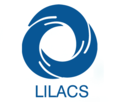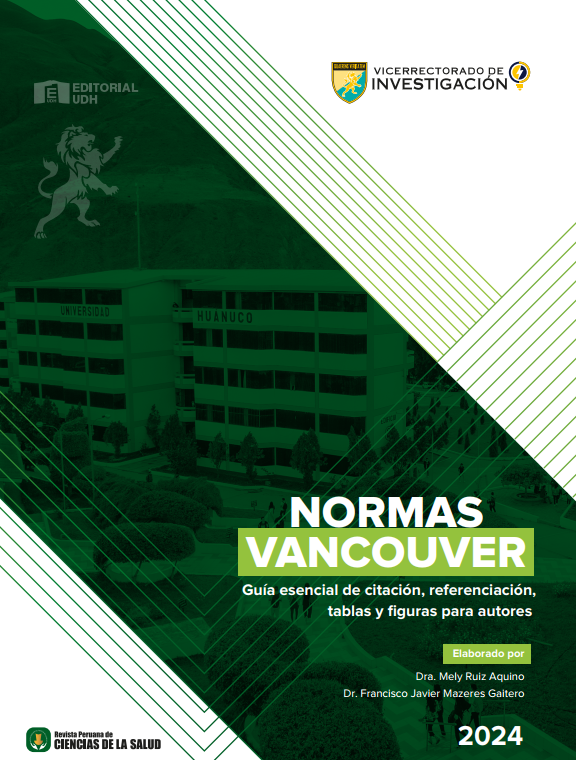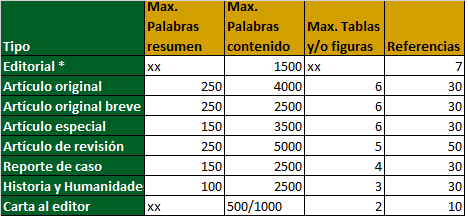Frecuencia de los genes de fusión BCR-ABL1, E2A-PBX1, MLL-AF4, y TEL-AML1 con leucemia linfoblástica aguda de células B
DOI:
https://doi.org/10.37711/rpcs.2023.5.1.402Palabras clave:
leucemia linfoblástica, pediatría, biología molecular, citogenética, inmunofenotipifcaciónResumen
Objetivo. Describir la frecuencia de los genes de fusión BCR-ABL1, E2A-PBX1, MLL-AF4, y TEL-AML1 en pacientes con leucemia linfoblástica aguda de células B en el Instituto Nacional de Salud del Niño de San Borja, Lima (Perú). Métodos. Se estudiaron 375 muestras de pacientes pediátricos diagnosticados con leucemia linfoblástica aguda de células B, recibidas en el Servicio de Genética, la cuales se detectaron los genes de fusión BCR-ABL1, E2A-PBX1, MLL-AF4, y TEL-AML1 en médula ósea o sangre periférica, utilizando la reacción en cadena de la polimerasa con transcriptasa reversa (RT-PCR). Resultados. Del total de muestras, 58 fueron positivas para los genes de fusión BCR-ABL1, E2A-PBX1, MLL-AF4 y TEL-AML1, las cuales tuvieron siguientes frecuencias: 2,13 %, 4,53 %, 0,53 % y 8,27 %, respectivamente. Conclusiones. El gen de fusión TEL-AML1es el más frecuente en nuestra población pediátrica, el cual está asociado con un pronóstico favorable. Conclusiones. El gen de fusión TEL-AML1, fue el más frecuente en nuestra población pediátrica.
Descargas
Referencias
1. Cooper SL, Brown PA. Treatment of pediatric acute lymphoblastic leukemia. Pediatr Clin North Am. [Internet]. 2015 [Consultado 2022 Nov 21]; 62(1): 61-73. doi: 10.1016/j.pcl.2014.09.006
2. Terwilliger T, Abdul-Hay M. Acute lymphoblastic leukemia: a comprehensive review and 2017 update. Blood Cancer J. [Internet]. 2017 [Consultado 2022 Jul 11]; 7(6): e577-e577. doi: 10.1038/bcj.2017.53
3. Onciu M. Acute lymphoblastic leukemia. Hematol Oncol Clin North Am. [Internet]. 2009 [Consultado 2022 Nov 21]; 23(4): 655-74. doi: 10.1016/j.hoc.2009.04.009
4. Van Dongen JJ, Macintyre EA, Gabert JA, Delabesse E, Rossi V, Saglio G, et al. Standardized RT-PCR analysis of fusion gene transcripts from chromosome aberrations in acute leukemia for detection of minimal residual disease. Report of the BIOMED-1 Concerted Action: investigation of minimal residual disease in acute leukemia. Leukemia. [Internet]. 1999 [Consultado 2022 Nov 22]; 13(12): 1901-28. doi: 10.1038/sj.leu.2401592
5. Agarwal M, Seth R, Chatterjee T. Recent Advances in Molecular Diagnosis and Prognosis of Childhood B Cell Lineage Acute Lymphoblastic Leukemia (B-ALL). Indian J Hematol Blood Transfus. [Internet] 2021 [Consultado 2022 Nov 22]; 37(1): 10-20. doi:10.1007/s12288-020-01295-8
6. ee JW, Cho B. Prognostic factors and treatment of pediatric acute lymphoblastic leukemia. Korean J Pediatr. [Internet]. 2017 [Consultado 2022 Nov 23]; 60(5): 129-37. doi:10.3345/kjp.2017.60.5.129
7. Chomczynski P, Sacchi N. Single-step method of RNA isolation by acid guanidinium thiocyanate-phenol-chloroform extraction. Anal Biochem. [Internet]. 1987 [Consultado 2022 Jul 8]; 162(1): 156-9. doi:10.1006/abio.1987.9999
8. Adnan-Awad S, Kim D, Hohtari H, Javarappa KK, Brandstoetter T, Mayer I, et al. Characterization of p190-BcrAbl chronic myeloid leukemia reveals specifc signaling pathways and therapeutic targets. Leukemia. [Internet]. 2021 [Consultado 2022 Apr 2]; 35(7): 1964-75. doi: 10.1038/s41375-020-01082-4
9. Guerra-Castillo FX, Ramos-Cervantes MT, Rosel-Pech C, Jiménez-Hernández E, Bekker-Méndez VC. [PCR detection of relevant translocations in pediatric acute lymphoblastic leukemia]. Rev Medica Inst Mex Seguro Soc. [Internet]. 2016 [Consultado 2022 Nov 23]; 54(Suppl 3): S302-8. Disponible en: https://pubmed.ncbi.nlm.nih.gov/27855054/
10. Artigas A CG, Cabrera C ME, Melo A A, Páez F E, Arriagada M M, Astete A C, et al. Frecuencia de los genes de fusión TEL/AML1 y BCR/ABL en pacientes pediátricos con leucemia linfoblástica aguda. Revista médica de Chile. [Internet]. 2006 [Consultado 2022 Jul 8]; 134(11): 1367- 76. Disponible en: https://www.scielo.cl/scielo.php?script=sci_arttext&pid=S0034-98872006001100003&lng=en&nrm=iso&tlng=en
11. Alonso CN, Gallego MS, Alfaro EM, Rossi JG, Felice MS. Caracterización molecular en leucemia linfoblástica aguda pediátrica en una institución hospitalaria. Hematol B Aires. [Internet]. 2006 [Consultado 2022 Jul 8]; 8-12. Disponible en: https://www.sah.org.ar/revistasah/numeros/vol10.n1.8.12.pdf
12. Berman JN, Greer W, Juskevicius R, Fernandez CV, Bernstein M, Couban S. Signifcant Discrepancy In Peripheral Blood Compared to Bone Marrow BCR-ABL Transcript Levels In Chronic Phase Chronic Myeloid Leukemia (CML). Blood. [Internet] 2010 [Consultado 2022 Nov 23]; 116(21): 4471. Disponible en: https://doi.org/10.1182/blood.V116.21.4471.4471
13. Luatti S, Baldazzi C, Marzocchi G, Ameli G, Bochicchio MT, Soverini S, et al. Cryptic BCR-ABL fusion gene as variant
rearrangement in chronic myeloid leukemia: molecular cytogenetic characterization and influence on TKIs therapy. Oncotarget. [Internet]. 2017 [Consultado 2022 Nov 23]; 8(18): 29906-13. doi:10.18632/oncotarget.15369
14. Amin H, Ahmed S. Characteristics of BCR–ABL gene variants in patients of chronic myeloid leukemia. Open Med.
[Internet]. 2021 [Consultado 2022 Jun 12]; 16(1): 904-12. doi:10.1515/med-2021-0309
15. King RL, Naghashpour M, Watt CD, Morrissette JJD, Bagg A. A comparative analysis of molecular genetic and conventional cytogenetic detection of diagnostically important translocations in more than 400 cases of acute leukemia, highlighting the frequency of false-negative conventional cytogenetics. Am J Clin Pathol. [Internet]. 2011 [Consultado 2022 Nov 24]; 135(6): 921-8. doi: 10.1309/AJCPJCW6BY0CNIHD
16. Addisia GD, Tegegne AS, Belay DB, Muluneh MW,Kassaw MA. Risk Factors of White Blood Cell Progression Among Patients With Chronic Lymphocytic Leukemia at Felege Hiwot Referral Hospital, Bahir Dar, Ethiopia. Cancer Inform. [Internet]. 2022 [Consultado 2022 Oct 4]; 21: 11769351211069902. doi: 10.1177/11769351211069902
17. Percival ME, Lai C, Estey E, Hourigan CS. Bone marrow evaluation for diagnosis and monitoring of acute myeloid leukemia. Blood Rev. [Internet]. 2017 [Consultado 2022 Nov 15]; 31(4): 185-92. doi: 10.1016/j.blre.2017.01.003
18. Paulsson K, Jonson T, Ora I, Olofsson T, Panagopoulos I, Johansson B. Characterisation of genomic translocation
breakpoints and identifcation of an alternative TCF3/PBX1 fusion transcript in t(1;19)(q23;p13)-positive acute lymphoblastic leukaemias. Br J Haematol. [Internet]. 2007 [Consultado 2022 Oct 21]; 138(2): 196-201. doi: 10.1111/j.1365-2141.2007. 06644.x
19. Tirado CA, Shabsovich D, Yeh L, Pullarkat ST, Yang L, Kallen M, et al. A (1;19) translocation involving TCF3-PBX1 fusion within the context of a hyperdiploid karyotype in adult B-ALL: a case report and review of the literature. Biomark Res. [Internet]. 2015 [Consultado 2022 Oct 22]; 3: 4. doi: 10.1186/s40364-015-0029-0
20. Daniel-Cravioto A, Gonzalez-Bonilla CR, Mejia-Arangure JM, Daniel-Cravioto A, Gonzalez-Bonilla CR, Mejia-Arangure JM, et al. Genetic rearrangement MLL/AF4 is most frequent in children with acute lymphoblastic leukemias in Mexico City. Leuk Lymphoma. [Internet]. 2009 [Consultado 2022 Nov 21]; 50(8): 1352-60. doi:10.1080/10428190903015636
21. Chiaretti S, Vitale A, Cazzaniga G, Orlando SM, Silvestri D, Fazi P, et al. Clinico-biological features of 5202 patients with acute lymphoblastic leukemia enrolled in the Italian AIEOP and GIMEMA protocols and stratifed in age cohorts. Haematologica. [Internet]. 2013 [Consultado 2022 Nov 16]; 98(11): 1702-10. doi: 10.3324/haematol.2012.080432
22. Cimino G, Cenfra N, Elia L, Sica S, Luppi M, Meloni G, et al. The therapeutic response and clinical outcome of adults with ALL1(MLL)/AF4 fusion positive acute lymphoblastic leukemia according to the GIMEMA experience. Haematologica. [Internet]. 2010 [Consultado 2022 Nov 17]; 95(5): 837-40. doi: 10.3324/haematol.2009.009035
23. Chung HY, Kim KH, Jun KR, Jang S, Park CJ, Chi HS, et al. [Prognostic signifcance of TEL/AML1 rearrangement and its additional genetic changes in Korean childhood precursor B-acute lymphoblastic leukemia]. Korean J Lab Med. [Internet]. 2010 [Consultado 2022 Nov 19]; 30(1): 1-8. doi:0.3343/kjlm.2010.30.1.1
24. Shurtleff SA, Buijs A, Behm FG, Rubnitz JE, Raimondi SC, Hancock ML, et al. TEL/AML1 fusion resulting from a cryptic t(12;21) is the most common genetic lesion in pediatric ALL and defnes a subgroup of patients with an excellent prognosis. Leukemia. [Internet]. 1995 [Consultado 2022 Nov 18]; 9(12): 1985-9. Disponible en: https://pubmed.ncbi.nlm.nih.gov/8609706/
25.Tsang KS, Li CK, Chik KW, Shing MM, Tsoi WC, Ng MH, et al. TEL/AML1 rearrangement and the prognostic signifcance in childhood acute lymphoblastic leukemia in Hong Kong. Am J Hematol. [Internet]. 2001 [Consultado 2022 Nov 20]; 68(2): 91-8. doi: 10.1002/ajh.1159
26. Marsán Suárez V, Sánchez Segura M, Socarrás Ferrer BB, Martínez Machado M, Cos Padrón Y, del Valle Pérez L, et al. Leucemia linfoide aguda común: Estudio del inmunofenotipo y las características clínicas y morfológicas. Rev Cuba Hematol Inmunol Hemoter. [Internet]. 2004 [Consultado 2022 Nov 20]; 20(2). Disponible en: http://scielo.sld.cu/scielo.php?script=sci_arttext&pid=S0864-02892004000200006
27. Chiaretti S, Zini G, Bassan R. Diagnosis and Subclassifcation of Acute Lymphoblastic Leukemia. Mediterr J Hematol Infect Dis. [Internet]. 2014 [Consultado 2022 Nov 27]; 6(1): e2014073. doi: 10.4084/MJHID.2014.073

Publicado
Número
Sección
Licencia
Derechos de autor 2023 Francisco Sánchez-Pinto, Gioconda Manassero, Mónica Carola Correa Guerrero, Guillermo Frank Romero Guerra, Julissa Fuentes Vera

Esta obra está bajo una licencia internacional Creative Commons Atribución 4.0.





















